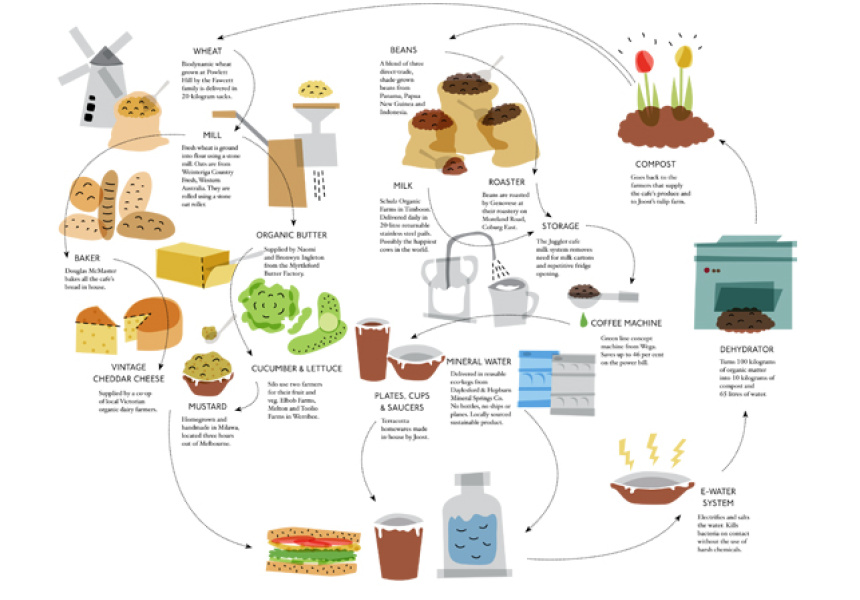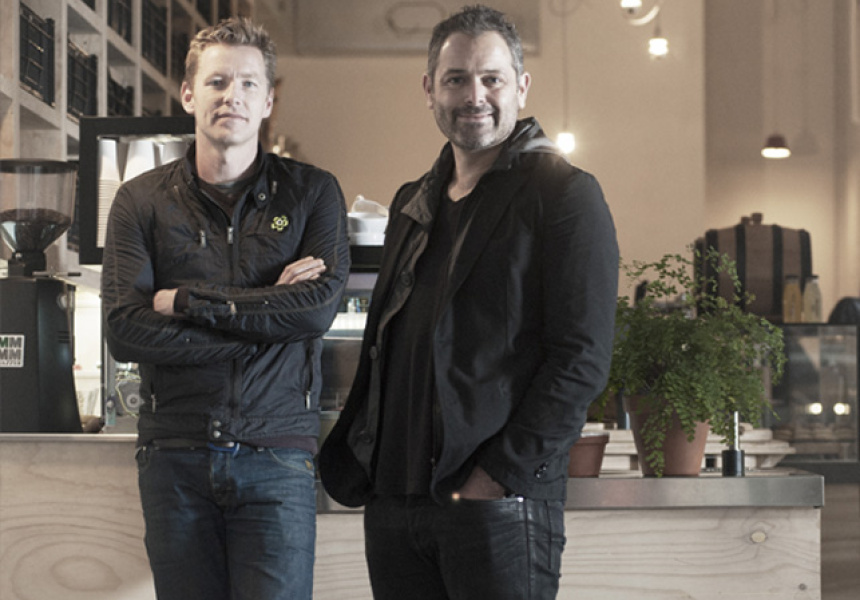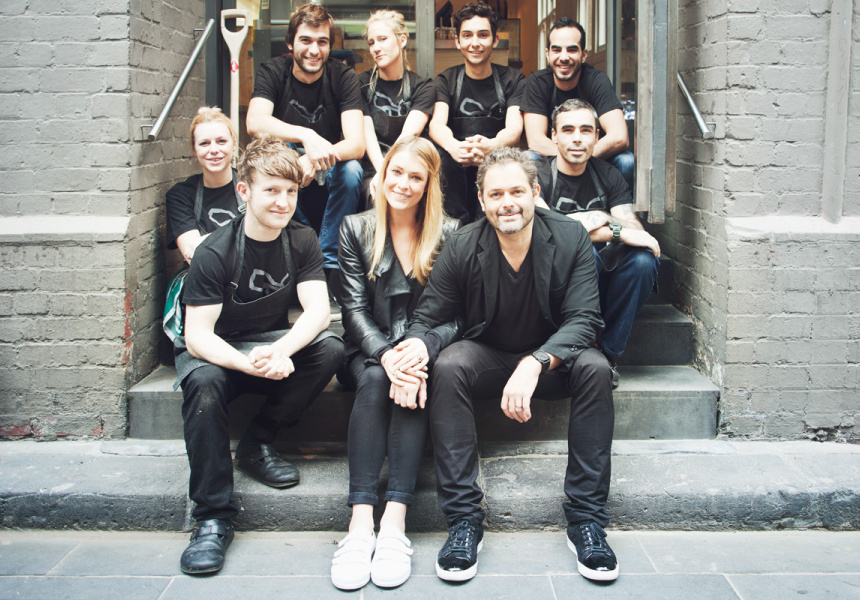For all the consideration, planning and processes that have been put into place to create Australia’s – if not the world’s – first zero-waste cafe, Joost Bakker and Danny Colls aren’t showing too many signs of strain today. If anything, perched out the front of a frenetic Silo by Joost on Hardware Street amid the scattering of outdoor furniture crafted from recycled aluminium irrigation pipes and leather off-cuts, it’s a sense of almost childlike enthusiasm that pervades the conversation.
“I’m motivated for the first time in 10 years about my industry,” urges Colls, known for his string of renowned cafes, which has included St Kilda institution Cafe Racer, Postal Hall, Coffee Darling, Federal Coffee Palace and, more recently, Liaison. “I’m learning to love my industry again by seeing farmers excited to deliver produce and the respect, then, that the staff have for the produce and how that relates back to the customer… You’re not dealing with manufacturers and packagers and transport companies and salesmen and agents and distributors.
“I’m very proud. Can you tell?” he laughs, his partner and collaborator Siany McLaine buzzing about working the front of house. “You can’t help but get excited.”
We think you might like Access. For $12 a month, join our membership program to stay in the know.
SIGN UPThere’s talk of driving down to Schulz Organic Farms outside Port Campbell next week “to pat the cows” which produce the milk for the cafe; there’s the dissection of the new blend of shade-grown, non-plantation coffee; there’s many a lively discussion about the benefits of freshly milled grain.
“That’s the thing with this place,” says Bakker of the humbly scaled, 50-square-metre cafe. “It’s very simple, but there’s a lot to explain.”
The eco-advocate and designer, who has gained more recent renown in hospitality circles for his temporary, sustainable Greenhouse restaurants (which have popped up in sites from Federation Square and Sydney Harbour to Southbank, as well as a permanent location in Perth) isn’t exaggerating.
That the bread used to make our fresh sandwiches was still in the form of organic, unmilled wheat earlier this morning – only to be milled in-house – goes some way to preface the extent of this stylish, though unassuming cafe’s operations. The fact that the cafe’s milk, mineral water, olive oil, gin and whiskey all arrive in forever reusable pails, eco-kegs or other containers direct from local suppliers makes it that little clearer. The $30,000 food waste dehydrator and steriliser that quietly hums away in a cramped back alley behind the cafe – which, for every 100 litres of food scraps, creates 10 litres of nutrient-rich fertiliser to be delivered back to the farmers who supply the cafe – simply confirms the point: Silo is an operation built on ecological and sustainable principles from the ground up. No unnecessary packaging comes in and no waste goes out.
“I firmly believe that restaurants have an opportunity to be really sustainable,” says Bakker. “You get the opportunity to buy in bulk and that’s a huge thing. We get the 20-litre stainless steel vats of milk and just in that, I would love to work out how many plastic bottles that saved in one year. And those vats will last for 20 years. There’s no reason why those vats won’t still be usable.
“It’s not until you force upon the business that there is no waste – the fact that you don’t need a cap on a keg, you don’t need stickers on avocados – that you really can work out the fine details of what can be achieved.”
Colls and Bakker’s relationship spans back to the early days of Cafe Racer, when one fo Bakker’s early flower businesses used to supply Colls’ cafe with tulips (“He used to bust my balls about those tulips,” Bakker laughs). In the wake of the Greenhouse ventures, the pair saw Silo as a perfect opportunity to join forces in order to “distil” and better articulate and make accessible the ideas that underpinned the original Greenhouse project.
“There were so many things going on with the Greenhouse,” says Bakker. “But this is understandable and adoptable.”
Colls agrees. “I love when our customers, who we’ve been serving for years and years in our other cafes, come in and they have no idea about the back story,” he says. “They get a great coffee, a great sandwich, or a bowl of rice or soup and they sit there and say ‘That’s fantastic’ and you don’t tell them. One day they’ll realise, ‘What’s going on in my diet?’
“If you start scratching, it goes all the way through to the core. It goes through to the biodynamic bread, to the milling of the flour, through to baking everyday. And it’s accessible to people’s perceptions. It fits within the boundaries of what people see and want every day, which is the best position from which to educate.”
As the name suggests, milling live grain each day for flour is one of Silo’s key focuses a key. “I hope that in 10 to 15 years time, we’ll be debating the grain from the Grampians in comparison to the Mallee and that we’ll be treating it like wine, in a regional sense,” says Bakker. “It just annoys me that farmers grow this amazing product and we treat it with no respect and no value…but wheat needs to be valued for what it is. It’s made human beings what we are today.”
Adds Colls with a smile: “It’s also great theatre to have a great big flour mill in the middle of a cafe.”
And from a business perspective, it’s working too. Indeed, while Colls is firm in framing Silo’s principles to be educatory rather than economic, he rests his “business hat” on the cafe’s efficiency. “Our food costs are down and our labour costs are up,” he says. “We’re giving more people more jobs, we’re giving farmers more money for…and from a balance of trade, that’s not a bad thing.
“Add the hospitality aspect and add a product that is not only enabling you to do something for yourself, do something for a farmer and that’s what it’s really all about. It's all part of the circle.”
For Bakker, it’s an achievable vision. “In 50 years time, our kids will be saying ‘Did you guys really create that much rubbish? Why was everything wrapped in plastic and why did you create so much waste?’” he says with a smile.
“I really believe that, because it’s not sustainable going forward and it will change.”
Silo by Joost
123 Hardware Street, Melbourne
(03) 9600 0588
byjoost.com/silo



